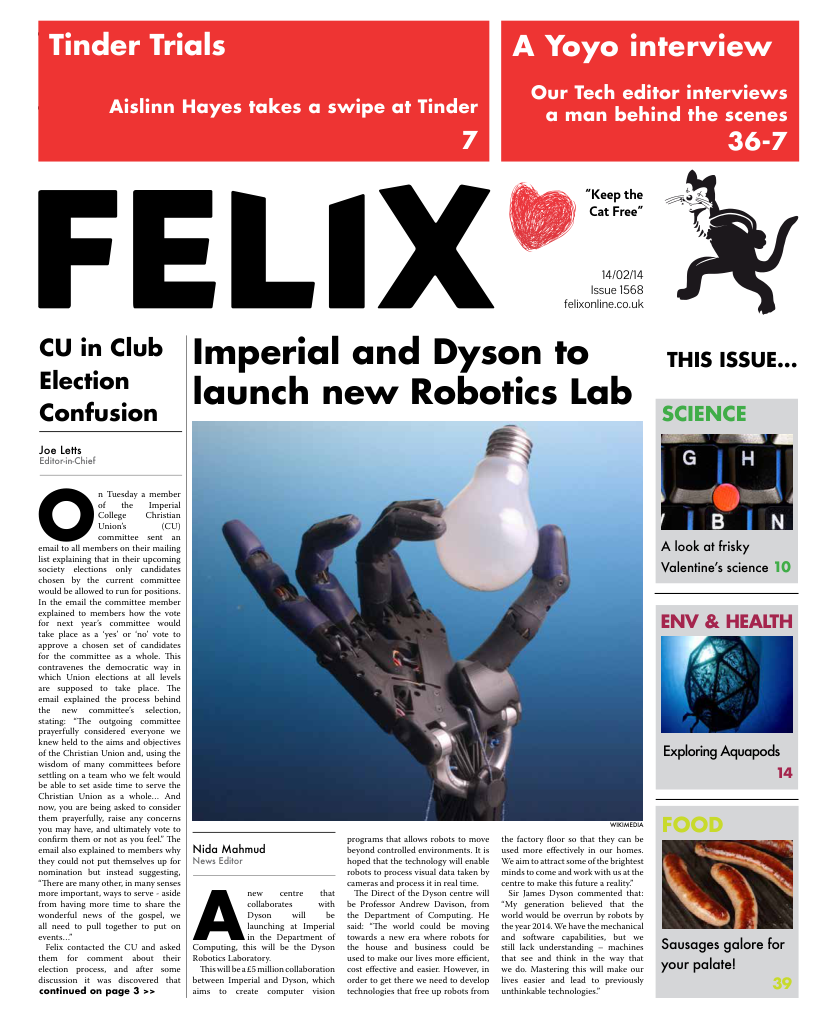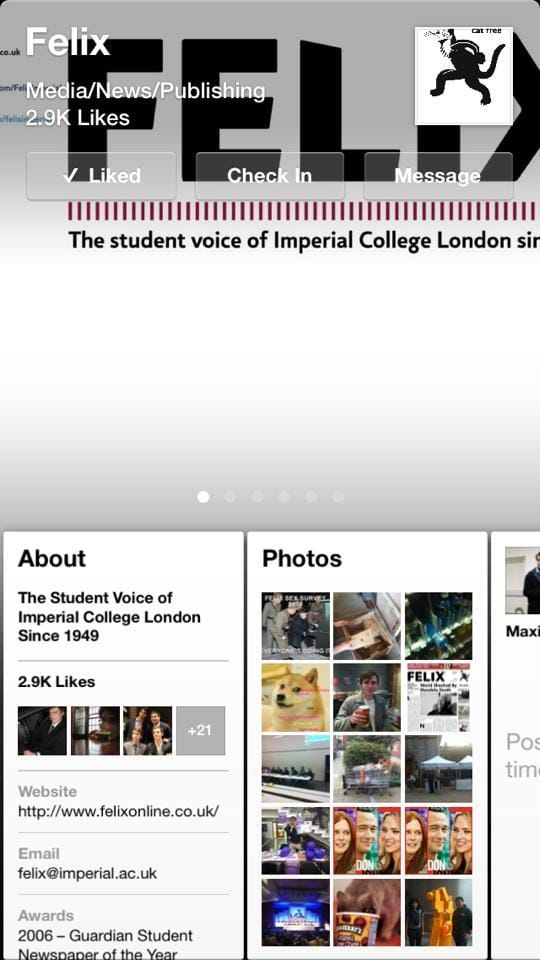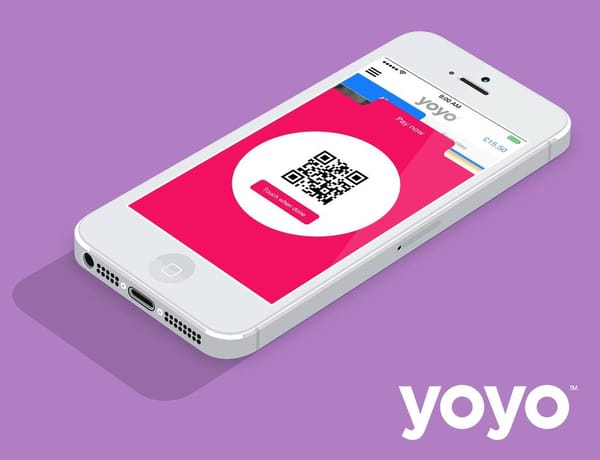Find the egg-laying chicken #yoyonotyolo
Max Eggl talking to one of the Yoyo founders Michael Rolph, on the merits of mobile and future plans of Yoyo at imperial
ME: Introduce yourself:
MR: My name is Michael Rolph, I am the co-founder of Yoyo which has launched very recently here at Imperial.
ME: What is the history of Yoyo, how did you guys start out?
MR: I’ve got a personal background which is very much from the payment space. Ex-Barclaycard business, First Data, Paypal and I’ve spent the last three or so years prior to Yoyo both as an investor and advisor in the financial technology space, specifically helping large corporations think about how they innovate in payments. I’ve been quite privileged to see a lot of what goes on out there. My two co-founders are equally serial entrepreneurs: Alain Falys was the founder of OB10 and Dave Nicholson founded Zopa, and both of them were talking about mobile payments. I’ve been from the space and every day I heard for the last 15 years or so about how mobile is going to be the future of payments. The reality is that this time last year, when the three of us got together, the conclusion was that there was nothing out there. There is a lot of talk about people like Google, Paypal and whoever else, but you realise that there is nothing there. There’s lots of startups that have tried to do mobile payments but nothing has stuck.
So the conclusion we got to was the that the only thing that looked interesting was Starbucks app. 13% of all their sales in the US and UK come from mobile devices. It was the one shining light, so we looked at their app in quite a bit of detail, as much as we could and we came to a few conclusions. Firstly, it was not built for purpose, it was just an extension of their pre-paid program. The other part of it was, actually, it got pretty bad pretty quickly. You get the instant stamp, but if you get enough stamps to get a reward, they send you the reward as a paper voucher to your home address. That is just insane. Then when it comes to offers, there is no context, there is no relevance to the offer they are sending you based on what you like and what you buy. So we quickly said, it’s really interesting, it works, it’s adding some value but there is a lot that could be better. Our starting point then became: Starbucks but better. So that’s how we came about.
ME: I know you have a link with Imperial Innovations, how did that start/work out?
MR: Alain [Falys] was actually a Venture Partner at Imperial Innovations and when we all three came together it felt quite natural that we should meet there. Innovations have been very early supporters of us as a team. We were unique and quite different from a lot of people who had tried this before and failed, because we were from the space and we are not a traditional set of entrepreneurs, as we are not first time entrepreneurs. We also had good connections in the retail space and we had a good view of it. So they supported us early on to make it [Yoyo] our full time job, as it were. So since September last year, all three of us have been really focused on Yoyo.
ME: So, I am also quite aware that you are active in other universities, why target universities and students?
MR: Launching something that changes, or gives someone the ability to change their behaviour, as mobile does, is not easy because you’ve got a two-headed beast to tackle. You’ve got to get the consumers, the users, as well as the retailer. The whole industry talks about this chicken and egg situation, but in my mind if you’ve find the thing that looks like the chicken that laid the first egg that then became the chicken, then its a pretty obvious point that you can do something with it. So we started off at universities, just as it worked for Facebook. What we are building here is a consumer network, and from that perspective, you need to get your critical mass pretty quickly, get some momentum. Equally you need to solve a problem, and when you think about what we’ve really done, even if we forget what Yoyo is going to do in the retail space, there are some real annoyances around paying and loyalty aspects in any closed campus environment that we addressed. Most would say, either you have to pay by cash or you’ve got to use some kind of closed-loop prepaid card, which you have to top up, and that can become quite a pain.
So although payment isn’t broken, there are a number of small annoyances like queueing for an ATM, having to deal with change, having to wait in a queue whilst someone mucks around with getting the right change or dropping their money, whatever it may be, that if you eliminate would make everything much easier and we’ve done that in a very simple way
ME: Now, more specific to Imperial, at the moment you are linked to Taste Imperial, are you planning to branch out to the Union?
MR: We are currently integrating into the Union, and at some point in February we expect to be there. We are actually testing today. We expect tobe up and running within fourteen days or so.
ME: At the moment it is only with Taste Imperial (food related establishments) are you planning anything with the gifts shop at Imperial for example?
MR: The only thing that currently isn’t able to accept Yoyo, or going to accept Yoyo within February are the shops, but we will bring the shops on board as well.
ME: In terms of features, is there anything that you are planning to release?
MR: The next release will include things like Pin-entry for access to the app, it will include automated top-up, and a whole bunch of things around the rewards, sort of Yoyo specific rewards but actually what we’ve got here is the first release, so we are actually building version 2, that will bring in things like being able to share rewards with friends for example.
ME: Currently you are only on Android and iOS, are you planning anything Windows?
MR: We will do a Windows application, probably towards the end of this year. We built something for Apple and Android, not because it’s not necessarily easier, but because that’s 95% of the market. However universities are actually one of the only areas where Windows has a proportionately higher share, so it is definitely on our list of things to do.
ME: Also you work with QR codes right now, what about NFC?
MR: The reason we work with QR codes, is because it is the easiest thing for a retailer. It works with all their existing hardware, the only thing we have to help them with is the scanners, but that’s relatively easy. As for NFC, we are not adverse to it, we are actually technology agnostic at the front end, so if NFC did become the norm, then absolutely we would make it part of the every-day experience of Yoyo.
ME: Do you see contactless cards as a competitor to Yoyo?
MR: No. A lot of people have issues with contactless cards in two ways. One, some places don’t accept them and equally not every bank doesn’t issue contactless cards. So a ubiquitous experience isn’t there. However, if someone is using them and they work, it works really well but what a contactless card doesn’t do what Yoyo does, is it doesn’t enable you to automate the whole stamping of the loyalty card, it doesn’t enable you to receive offers. What we are building is fundamentally very different. What we have got is, effectively, a marketing tool for retailers to have a better relationship with consumers, by sending them more offers or giving them more rewards.
ME: One aspect that seemed to put a lot of people off yoyo was security issues, and one of the things that did worry them was the whole pin thing, if you lose your phone for example.
MR: : Let’s put this into some context. On the table in front of me, I have my wallet and my phone. Which one is easier for you to get access to money from? The wallet, right? So the minute you have access to my wallet, you have access to any cash I have in my wallet, access to my contactless card, my credit cards and you had to do nothing to get there. Now if I say you have my phone, away you go. If its locked, there’s not much you can do. So there is a reliance that most people do have a first line of authentication to get into the device, be it fingerprint, pin or passcode. Then on the app itself if someone wants to add a pin on top of that, on the next version we are releasing, then they can do that. So we have two layers of authentication, which is more than on a wallet. Equally, once you have my card details you can go online and do all sorts of things. One can probably get your card, find out date of birth and address pretty easily, believe it or not, and do whatever they want. With Yoyo, the minute you’ve lost your phone, you will realise. You will realise you lost your phone before you’ve lost your wallet. Your phone is your third arm. So the first you can do is then lock the phone, end of story. Then you can Yoyo, and ask us to block your account. There is a whole bunch of things that you can do very quickly, that you can’t do with a wallet. It’s very simple.
ME: Another thing that comes to mind, it seemed incredibly easy to set up a yoyo account. You only needed a name, account number, sort code and address. So what stops me, finding out that information of someone else, and then putting their account details onto my Yoyo account?
MR: We do a lot of background checking, we match your username versus bank details. We are also partnered with GoCardless, which is a very well established direct debit management platform. I hope though, that the first thing that would stop you, is that you aren’t a criminal. However you can’t rule it out, though I strongly advise anybody studying here not to do it. On the basis that they are messing with their future.
ME: Lastly in terms of secturity: We currently live in the world of Big Data. Obviously Yoyo get data from the users, what is your policy on that?
MR: Around data, and anything we do whether it’s on Facebook or Twitter, everything is accessible to everybody. They govern this under a term called the privacy policy, which is exactly the opposite. So what we have done, is turned that on its head a bit. We have come up with something called the transparency agreement, and as part of that transparency agreement, what we state is that we will never share your data with a merchant. What that means, is your contact information, even your name, because there is no need to. What we can let the retailer know is what you are buying, but they know that anyway. What we do is give it to them in a way that at least gives them a little insight, to better engage you with offers that are relevant. So what we do share is for the benefit of driving better offers, better rewards for different customer segments, different users. What we don’t share is the personal identifying information. We don’t share any of the financial information around funding methods, or anything like that. So we see ourselves as a kind of film in between, which manages the relationship on both sides, user and retailer, for the benefit of both in a way that doesn’t conflict anyone in anything they don’t want to be conflicted in.
ME: So given now that you have all the aforementioned data, will you be able to give personalised offers?
MR: : Absolutely. In fact my next meeting is with Catering Services, to talk about Yoyo specific only offers. Going forward, this is totally what this is about. Actually you can start to categorize people into segments pretty quickly, based on an understanding of what they buy.
If you are buying coffee two times a day, you may sit to the right hand side of a spectrum of coffee drinkers. Then what would the segment coffee drinkers like to eat with their coffees. Perhaps a coffee and pastry type of offer would work for them and if they are buying coffee at 8:30 in the morning, then we should send their offers 8 o’clock, so they can think about it and then take advantage of it. So, where we are going with Yoyo, is actually about creating, from the user’s perspective, a personalised commerce environment. You are defined by your behaviour, your behaviour is where you choose to spend money. We are not suggesting where you do it, we are offering you the ability to manage the world in the way you want it, so you can see the offers and rewards that are most meaningful to you.
What we all recognize, we, the founders of Yoyo, are consumers, too. A lot of the things that lead to Yoyo, are because I found being bombarded by e-mails and texts really annoying. I don’t care that I am near a Starbucks, I just don’t care. So every time it pings up in Passbook, I just turn it all off. But what I do care about for example a Fernandez and Wells - which is my favourite coffee joint - I would like to know if I am near one. So to be able to personalise that experience in a way where I don’t have to download multiple retailer apps would be great!
ME: So are you planning to expand out of universities?
MR: What we are building is definitely for the high street as well as for the campus, the reason being is that we want to start bringing is the ability to give more to you, the consumers, of things that they like. As a consumer, what do we really want out of any transaction? We want to pay less, and we want to get more, and that is totally what Yoyo is relying on doing. Yes, a retailer wants to sell more, but obviously it also wants to provide a great customer experience and wherever possible they want to save money. Saving money is equivalent to not wasting money. By enabling retailer to offer rewards that are more appropriate for different segments, ticking the boxes that they want to tick. Most importantly for a users perspective, you are starting to get things that are relevant to you, and not just homogenised for anybody.
ME: So on a completely different note, why Yoyo? What’s with the name?
MR: Choosing a name is very difficult in today’s world of startup boom. The first thing about Yoyo is that everyone knows what a yoyo is. It’s very international in terms of its pollination of language. Yoyo is a yoyo everywhere you go and most people, unless you had one ping you in the eye, have a positive experience. It’s very playful and very engaging. Equally if you think of the process of spinning a yoyo out, and then coming back to you, it’s the same thing when you think about paying for something and what you get back is rewards and offers. So, it’s a very engaging process, and it’s memorable, right?
ME: Any last thoughts, any thing left to say? Maybe why imperial students should use yoyo?
MR: The reason why we chose Imperial is because there is a high concentration of smart people in one place and you know, if we are going to build something relevant for the world, what better place than to launch it at Imperial. The feedback we get is invaluable to help us create a better consumer experience, which we all love and all consumers would benefit from that. It’s something that’s very quick and simple. Our belief is that if we get it right here, and get it right at the other universities we are going to roll Yoyo out at, that the concept that we can go to the world with is that smart people buy with Yoyo. I would encourage everyone to download it, use it and start taking advantage of the Yoyo specific rewards and offers.
ME: Sorry to keep you, but one last question; You had this 10% offer for topping up in January. Sadly that’s over now, but do you have any other promotions to encourage more people to start using Yoyo?
MR: : In February, we are running prize draws, whenever you pay with Yoyo on campus you have a chance of winning either £10 or £50 of Yoyo balance (there are multiple winners). We will be doing the first draw at the end of this week, and that is running throughout the whole of February. You can get the updates on the winners on Twitter at @justyoyo, and On our page on Facebook.We are definitely making sure that there is a chance for people to win and enjoy their Yoyo experience.









